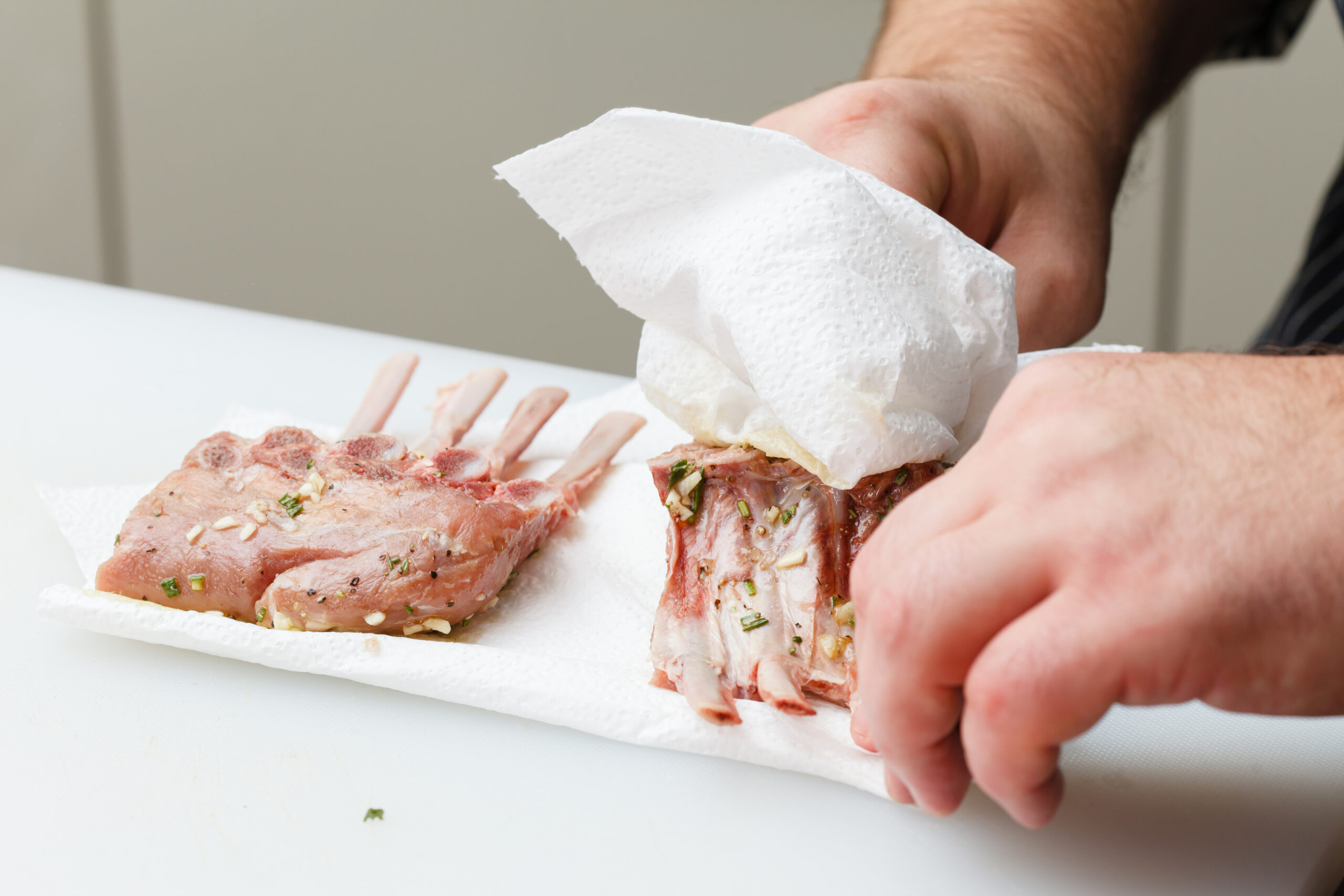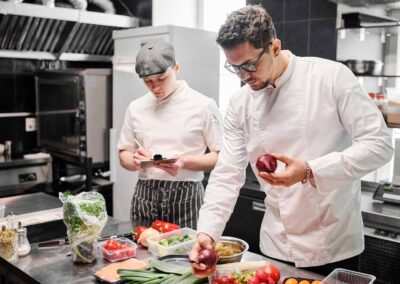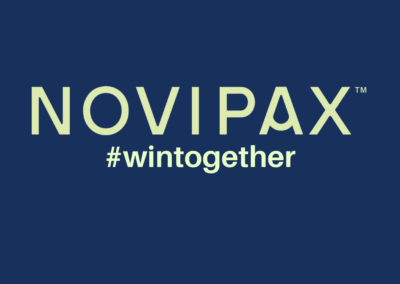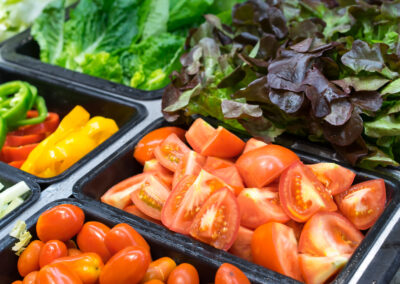Picture this: It’s Friday night service, your restaurant is packed, and a customer mentions their fish dish tastes slightly different than usual. Despite your careful preparation and quality ingredients, something subtle has affected your creation. One potential culprit that often goes unexamined? The standard paper towels used throughout your kitchen processes. But are paper towels food safe? In this blog, we’ll explore this question and discuss the potential impact of paper towels on food quality and safety in professional kitchens.
Paper Towels: A Kitchen Staple Worth Reconsidering
Many professional chefs report that they never really considered the impact of paper towels until conducting comprehensive reviews of their kitchen practices. Looking at everything that touches food often reveals that paper towels contact ingredients far more frequently than initially thought.
American kitchens use billions of pounds of paper towels annually, and they’ve become such a standard tool that few chefs pause to consider their potential impact on food quality and safety.
How Paper Towels Interact With Your Ingredients
Professional kitchens typically use paper towels for several critical tasks, but one common question is: are paper towels food safe? While they are widely used, there are some considerations to keep in mind:
Drying Washed Produce
When patting dry delicate greens or vegetables, paper fibers and any residual chemicals from manufacturing could transfer to ingredients that won’t undergo further cooking.
Drying Proteins Before Cooking
Many chefs pat proteins dry with paper towels to achieve the perfect sear. While generally effective, some culinary professionals have reported noticing differences in moisture levels compared to using specialized food-safe absorbent materials.
Surface Cleaning
The same paper towel might be used across multiple stations during busy service, creating potential cross-contamination concerns.
The Science Behind Paper Towel Considerations
Several scientific factors make paper towel usage worth examining for quality-focused chefs:
Chemical Compounds
Some paper products contain processing chemicals that, while food-safe in the quantities present, might interact with certain ingredients. These compounds can be especially relevant when working with delicate flavors in raw applications.
Fiber Transfer
Paper fibers can occasionally separate from towels and adhere to ingredients, potentially affecting texture in particularly delicate preparations.
Bacterial Considerations
Research published in the American Journal of Infection Control has found differences in bacterial counts between recycled and virgin pulp paper towels, with recycled versions generally harboring more bacteria—something worth considering in a food safety context.

Are Paper Towels Food Safe?
On one hand, paper towels are made from materials approved for food contact, and any chemicals used in their production are present in quantities that meet safety standards. They are a convenient and effective tool for many kitchen tasks, from drying produce to cleaning surfaces.
On the other hand, as we’ve explored in this blog, there are potential concerns to be aware of. Paper towels can sometimes transfer fibers or residual chemicals to food, affecting the texture or flavor of delicate ingredients. Moreover, recycled paper towels have been found to harbor more bacteria than those made from virgin pulp, raising potential food safety issues.
These concerns may be significant for chefs committed to the highest standards of quality and consistency. Even subtle differences in moisture levels or the presence of foreign particles can impact the final product, especially in dishes where the pure flavor and texture of the ingredients are paramount.
Specialized food-safe absorbent materials, such as those offered by Novipax, can provide a valuable alternative. Designed specifically for food contact, these materials minimize the risks associated with paper towels while providing superior absorbency, consistency, and safety performance.
By choosing to use specialized absorbent materials, you can elevate your culinary creations and ensure that every detail of your preparation process contributes to the excellence of your dishes.
Visit novipax.com to learn more about how Novipax’s products can enhance food safety and quality in your kitchen.
A Restaurant Experience: The Advantage of Specialized Absorbent Materials
When a high-end restaurant received customer feedback about subtle inconsistencies in its signature crudo dish, the kitchen team thoroughly reviewed its practices.
After examining everything from sourcing to plating techniques, they considered how they were drying their fish. They found dramatically more consistent results when experimenting with Novipax’s food-specific absorbent materials instead of standard paper towels. The difference was subtle but meaningful for a dish where the pure flavor of the fish is central.
Evaluating Your Kitchen Practices
Consider this professional reflection exercise: For one week, observe and document when paper towels directly contact food in your kitchen:
- Which dishes might be affected?
- What alternative materials could achieve better results?
- How could specialized food-safe absorbent products enhance your culinary creations?
Many chefs who track their paper towel usage report being surprised at how frequently these products touch their ingredients, prompting them to switch to Novipax’s professional-grade absorbent materials.
Professional Alternatives to Consider
For chefs committed to refining every aspect of their preparation, Novipax’s food-specific absorbent materials offer significant advantages:
- Material Consistency: Products designed specifically for food contact with no unwanted chemical transfer
- Reduced Fiber Shedding: Virtually no loose fibers to potentially compromise texture
- Application-Specific Options: Different materials optimized for various kitchen needs
- Environmental Considerations: Sustainable options that align with modern restaurant values
Implementing More Deliberate Practices
If you’re interested in refining your approach:
- Identify Key Contact Points: Note where absorbent materials regularly touch food
- Staff Awareness: Train your team on the proper use of professional-grade absorbent products
- Comparative Testing: Conduct side-by-side comparisons to see the meaningful difference
A Matter of Professional Standards
Your culinary reputation rests on attention to detail and consistent excellence. The overarching principle is about being intentional throughout every aspect of food preparation. In the same way chefs are particular about ingredients and tools; they should be thoughtful about everything that touches their food.
Consider the challenge: Review your kitchen’s paper towel usage and explore how Novipax’s specialized food-safe absorbent materials can enhance your preparations and elevate your culinary creations. Sometimes, minor refinements make the most meaningful differences in your final results.
Visit novipax.com for more information about Novipax’s specialized food-safe absorbent materials and ways to enhance food safety while preserving culinary integrity in your establishment.



